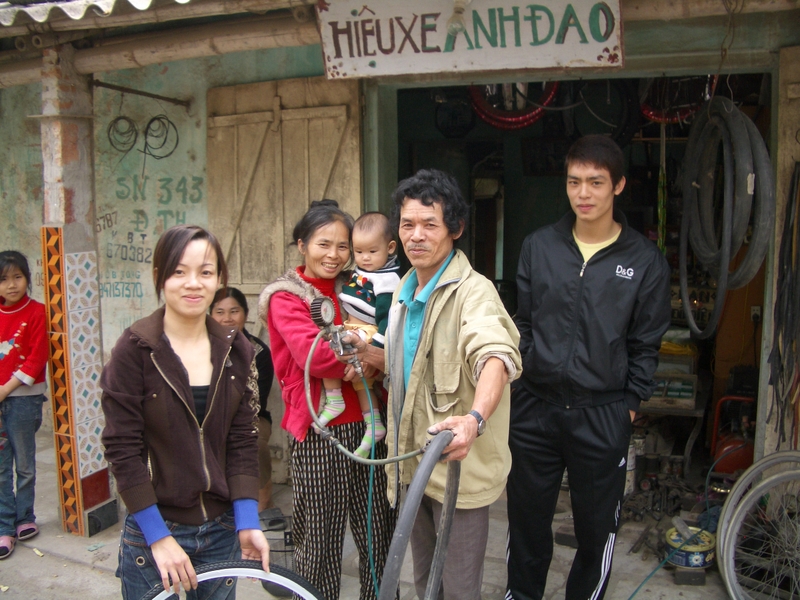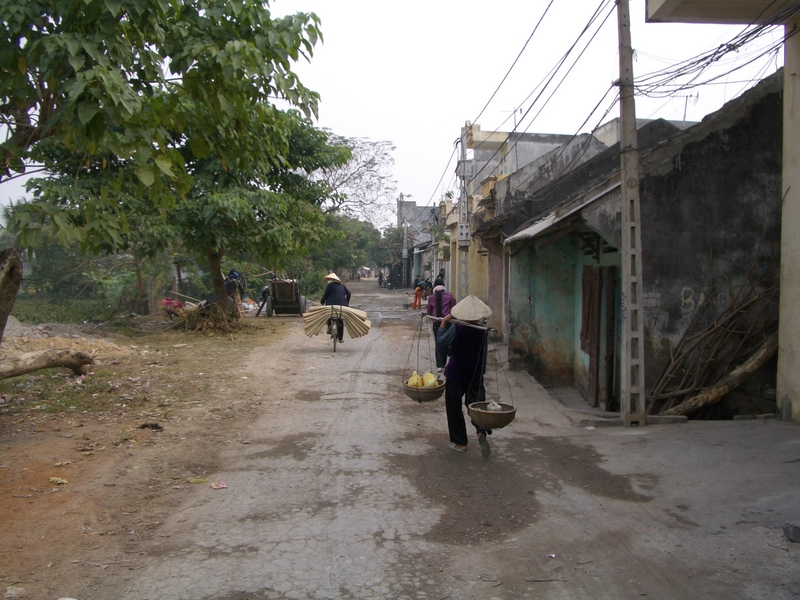
Yesterday I met Mr. and Mrs. Phung, their two children and their granddaughter. The Phungs run a bicycle repair shop. It is a small shop on a partially paved, pot-holed street on the outskirts of Thanh Hoa City, Vietnam (150 kilometers south of the capital, Hanoi). Had it been a few houses further down the street, Mr. and Mrs. Phung would have enjoyed views over the rice paddies.


Bicycles are repaired on what would be the pavement, if one existed. As with many homes, the front room not only acts as a sort of living room but also as a place of business; in this case a store room for bicycle parts. Bicycle tires and tubes hang from the ceiling and brakes, brake cables, pedals, baskets, etc. are stored in cubby holes on the wall. Even with the entryway wide open, one’s eyes take a moment to adjust to the dark inside.
Mr. and Mrs. Phung had been warned in advance of this foreigner’s arrival and welcomed me into their home. We were there with one of the Fund for Thanh Hoa Poor Women’s loan officers to distribute a group loan.
While each borrower was lent almost 3.1 million VND (~ US$181), they all said they wanted to borrow much more but couldn’t. I’ve heard this complaint many times as I usually ask borrowers what they like most about the Fund for Thanh Hoa Poor Women (“FPW”) and where they’d like to see improvements. As I knew, FPW restricts the amount that individuals can borrow by reference to their credit history, and 6 million VND (~US$353) was the absolute maximum loan amount. So I wondered why borrowers wanting more money didn’t borrow from the bank. After all, it is not uncommon to hear FPW’s borrowers such as Mr. & Mrs. Phung say they expect to make a profit of 2 million VND (~ US$118) per month on a 12-month 3.1 million VND loan.
Now many poor borrowers the world-over can’t borrow from a bank because they have nothing to offer as collateral. But this appears not to be the case in rural Vietnam where most people own their houses and the land on which their houses are built. Which raises another very interesting question: how poor are these borrowers?
I know the answer to the first question is much more complicated than I’ll ever learn but from my few short weeks in Vietnam, here are two pertinent discoveries: many borrowers don’t have title deeds to their properties and some who do aren’t willing to risk losing their homes on a business loan. Being told the latter by Mr. Phung (while Mrs. Phung tended to her granddaughter’s needs) was particularly revealing. Here was a borrower who was willing to borrow money from a loan shark at an <a href=”http://www.mftransparency.org/”>APR</a> of 188% but they wouldn’t mortgage their house to obtain a more favorable interest rate (fortunately for Mrs. Phung, FPW loans carry an APR of only 24%). On the other hand, maybe the Phungs were more clued-in than I give them credit for as I’m sure many small business owners in the US will rue the day they gave their bank a personal guarantee on their small business loans.
I also wonder, in light of the aforementioned discovery, how poor FPW’s borrowers really are. Now I really am tip-toeing into a mindfield. So let me skirt around the edges. <a href=”http://www.cgap.org/p/site/c/aboutus/“>CGAP</a> (the Consultative Group to Assist the Poor), the leading independent resource for objective information, expert opinion, and innovative solutions for microfinance, defines the <a href=”http://econ-www.mit.edu/files/530/”>poor</a> as those living on less than $2 dollar per day per capita. I haven’t yet investigated how this definition takes into consideration real estate ownership. The fact that FPW’s borrowers benefit enormously from such small loans (particularly given the alternatives) is good enough reason to lend to them. But are they really that poor? It is a question that many Kiva Fellows I’ve spoken to ponder. And it is a question I will continue to research and think about.
Postscript: Today, at the opening ceremony for FPW’s fifth branch, the local People’s Committee member welcomed FPW into his district saying, among other things, that he hoped the provision of loans to women in his district would prevent them having to leave their homes to search for work elsewhere. He went on to say that some who did were “stolen into China” – which my interpreter translated to mean sold as wives to Chinese men. Indeed, my translator told me that one of her parents’ neighbors had been sold to China, only to return 10 years after her disappearance. A sobering thought which puts theoretical questions related to “poverty” into perspective.
/>PREVIOUS ARTICLE
Loneliness in front of Immigration Office with tears →NEXT ARTICLE
It Costs $5000 To Marry Your Daughter?!?! →













